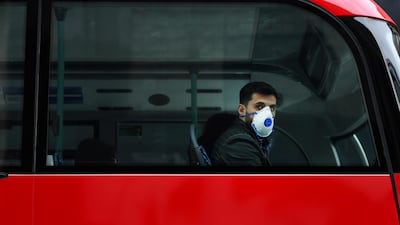Britain’s elderly could be placed under quarantine for as long as four months under the government’s planned response to the coronavirus.
The plan to keep people over the age of 70, the group most at risk from the novel coronavirus known as Covid-19, at home is one of a number of "wartime-style" measures being considered by UK Prime Minister Boris Johnson's government.
Health minister Matt Hancock wrote in the Sunday Telegraph: "We will be setting it out with more detail when it's the right time to do so because we absolutely appreciate that that is a very big ask of the elderly and the vulnerable and it's for their own self-protection."
He said the announcement would come “certainly in the coming weeks, absolutely”.
Mr Hancock called on the country to come together as the older generation had done during bombing in the Second World War.
“Despite the pounding every night, the rationing, the loss of life, they pulled together in one gigantic national effort,” he wrote. “Today our generation is facing its own test, fighting a very real and new disease. We must fight the disease to protect life.”
The UK government has also called on manufacturers to bolster national production of ventilators as part of its preparations.
Number 10 said on Saturday that the prime minister was due to speak to manufacturers about supporting the production of essential medical kit.
Engineers had been asked to find ways to quickly produce more ventilators in Britain for the government to buy.
Germany and Italy have scrambled to obtain more ventilators, and manufacturers warned on Friday that hospitals everywhere faced a lack of equipment needed to treat coronavirus patients.
The Sunday Telegraph said companies including Rolls-Royce had been asked by Mr Johnson to transform their production lines to produce ventilators as part of a "national effort".
The forced requisitioning of hotels and other buildings as temporary hospitals and the requisitioning of private hospitals have also been reported by British media as options being explored by ministers.
Mr Johnson has been criticised for not taking more drastic steps in the face of the health emergency presented by the coronavirus. The UK approach to the pandemic has been conspicuously moderate compared with measures taken in other European countries.
Health authorities in England announced another 10 coronavirus deaths, almost double the total since Friday, although the toll remains lower than in Italy, Spain and France.
The British government also plans next week to publish legislation giving it the powers to prevent mass gatherings and compensate organisations.
On Friday, England’s soccer Premier League suspended all matches until April 4 and the London Marathon was postponed.
Queen Elizabeth, who is 93, cancelled some public engagements for next week.
Mr Johnson postponed for a year local and mayoral elections in England that had been due to take place in May.
As of Saturday morning, 21 people had died after testing positive for Covid-19 in Britain.
“All 10 individuals were in the at-risk groups,” Chris Whitty, chief medical officer for England, said in a statement.
By comparison, Italy said its death toll from Covid-19 had risen to 1,441 and France reported an increase to 91.

